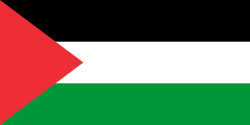| Palestine at the 2011 Asian Winter Games | |
|---|---|
 | |
| IOC code | PLE |
| NOC | Palestine Olympic Committee |
| in Astana and Almaty | |
| Competitors | 2 in 1 sport |
| Flag bearer | Mohammed El Batta |
| Medals |
|
| Asian Winter Games appearances | |
Palestine participated in the 2011 Asian Winter Games in Almaty and Astana, Kazakhstan from January 30, 2011, to February 6, 2011.